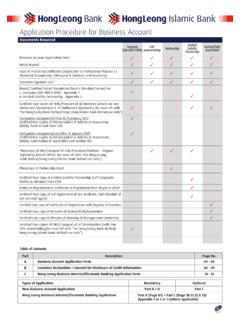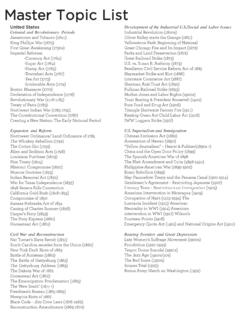Transcription of Reporting Instructions Manual - MyFloridaCFO.com
1 DEPARTMENT OF FINANCIAL SERVICES. Division of Unclaimed Property Florida Division of Unclaimed Property Reporting Instructions Manual DFS-A4-1992. Revised July 2017. Rule , Page 1. The Reporting Instructions Manual is designed to provide the information and requirements for Reporting and remitting unclaimed property to the Florida Department of Financial Services, Division of Unclaimed Property (Department) as required under The Florida Disposition of Unclaimed Property Act and Regulations, Chapter 717, Section 1 of this Manual is a comprehensive guide to provide information and requirements for Reporting and remitting unclaimed property to the State of Florida. Section 2 of this Manual is frequently asked questions intended to assist holders concerning unclaimed property Reporting requirements. The Holder Reporting Online System is the Department's online Reporting application that allows holders to file the required unclaimed property report(s) and remittance in a safe and secure online environment without the need for paper reports.
2 Section of this Manual contains Instructions on how to use this system to report and remit unclaimed property. The Department periodically conducts Unclaimed Property workshops to help educate the holder community in Reporting unclaimed property. Visit our web page at and click on the Events link to see scheduled workshops or contact the Compliance Section at (850) 413-5522 for more information. Contact the Reporting Section if you have any questions about the Reporting of unclaimed property at the following: Tel. - (850) 413-5522, Fax - (850) 413-3018 and E-mail - Page 2. 1. SECTION 1 STEPS IN Reporting AND REMITTING UNCLAIMED PROPERTY TO FLORIDA 4. STEP 1 -IDENTIFY THE UNCLAIMED PROPERTY TO BE REPORTED AND REMITTED ..5. STEP 2 PERFORM DUE DILIGENCE ..6. Sample Due Diligence Letter ..6. STEP 3 PREPARE AND SUBMIT THE REPORT OF UNCLAIMED PROPERTY AND.
3 REMITTANCE/PAYMENT ..7. ELECTRONIC REPORT FORMAT OPTION ..8. CREATING THE NAUPA FILE ..8. SUBMITTING THE NAUPA FILE TO THE STATE OF FLORIDA ..9. Manual INPUT OPTION ..9. REMITTANCE / PAYMENT ..9. CASH RELATED SECURITIES RELATED PROPERTY .. 10. SAFE DEPOSIT BOX TANGIBLE PROPERTY .. 12. PROPERTY TYPE CODES, RELATIONSHIP CODES AND TANGIBLE CATEGORY CODES .. 14. FLORIDA PROPERTY TYPE CODES AND DORMANCY TABLE .. 14. RELATIONSHIP CODES .. 18. TANGIBLE PROPERTY CODES .. 21. 2. SECTION 2 FREQUENTLY ASKED 22. WHAT IS UNCLAIMED PROPERTY? .. 22. HOW TO REPORT UNCLAIMED PROPERTY? .. 22. Determine Where to Report .. 22. Do holders need to report items under $50? .. 22. Do holders have to file a zero report if the holder has never filed an unclaimed property report? .. 23. If you are a holder who has previously filed an unclaimed property report with Florida, but does not have any unclaimed property to report this year, do you have to file a zero report with Florida?
4 23. How to submit an unclaimed property report and remit the property? .. 24. CAN A HOLDER REQUEST AN EXTENSION OF THE REPORT DUE DATE? .. 24. WHAT IF A HOLDER HAS QUESTIONS REGARDING THE Reporting OF UNCLAIMED PROPERTY? .. 24. HOW LONG MUST A HOLDER RETAIN RECORDS RELATING TO THE UNCLAIMED PROPERTY? .. 25. CAN THE HOLDER REPORT UNCLAIMED PROPERTY DUE TO OTHER STATES THROUGH FLORIDA? .. 25. SPECIAL NOTE TO HOLDERS Reporting UNCLAIMED PROPERTY HELD OR OWING UNDER ANY LIFE OR. ENDOWMENT INSURANCE POLICY OR ANNUITY CONTRACT .. 25. Page 3. 1. SECTION 1 STEPS IN Reporting AND REMITTING UNCLAIMED. PROPERTY TO FLORIDA. The following flow chart summarizes the steps involved in Reporting and remitting unclaimed property to the State of Florida: Online Application - If you are not already registered to use our online holder Reporting system, adopted in Rule , Florida Administrative code ( ), you must follow the steps identified in the chart below.
5 The Holder Reporting Online System can be accessed from the unclaimed property website at Page 4. by clicking on the Report & Remit Unclaimed Property link. You will find valuable information under this tab including a Step-By-Step Tutorial on how to use the system. information. Go to our website at with the UPID in our system STEP 1 -IDENTIFY THE UNCLAIMED PROPERTY TO BE REPORTED. AND REMITTED. Unclaimed property is primarily an intangible property liability that has been inactive on the books of an entity for a period of time (dormancy period) for which there has been no owner generated activity. Once these liabilities are identified, the next step is to determine which states' unclaimed property laws must be followed for each property; specifically the requirements as to the dormancy period before becoming unclaimed property, performing due diligence, how to report and when to report the unclaimed property.
6 This is determined based on the following Supreme Court decisions: (I) The1965 Supreme Court decision held in the Texas v. New Jersey, 674, 85 626, 13 596 (1965), which established the Rules of Jurisdiction. (II) The 1972 Pennsylvania v. New York, 407 206, 92 2075, 32 693 (1972), which established the Transaction Rule. The decisions held in the above cases established the fundamental rules that determine the requirements as to where a holder should report unclaimed property. Accordingly, the following rules have been adopted for Reporting unclaimed properties: The Primary Rule in determining where to report intangible unclaimed property dictates that intangible unclaimed property should be reported to the state of the owner's last known address. Page 5. The Secondary Rule in determining where to report intangible unclaimed property dictates that when there is either an unknown owner, no last known address or the owner's address was located in a state or country without an applicable unclaimed property law, the intangible property is be reported to the holder's state of domicile.
7 The Transaction Rule in determining where to report intangible unclaimed property dictates that traveler's checks, money orders and similar written instruments would be reported to the state where the transaction occurred. Based on these rules, once you have identified the liabilities that will be subject to Florida's unclaimed property law, you must follow the requirements set forth by Florida. Under Chapter 717, , a last known address that provides only that the owner was a resident of Florida is sufficient for Reporting purposes. The Florida Property code and Dormancy Table, provided in this document, is a helpful tool in identifying properties that may potentially become unclaimed. Once the liability you identified reaches the required dormancy period, it becomes unclaimed property and reportable to Florida. STEP 2 PERFORM DUE DILIGENCE.
8 Prior to Reporting and remitting unclaimed property which has reached its required dormancy period (as explained in STEP 1) for an applicable calendar year, section (4), , requires that for all the unclaimed property accounts valued at $50 or greater, the holder must perform due diligence. The due diligence must be performed not more than 120 days and not less than 60 days prior to the report of unclaimed property and remittance due date, which is before May 1 of each year. Per section (9), , due diligence means the use of reasonable and prudent methods under particular circumstances to locate apparent owners of inactive accounts using the taxpayer identification number or social security number, if known, which may include, but are not limited to, using a nationwide database, cross-indexing with other records of the holder, mailing to the last known address, unless the last known address is known to be inaccurate, or engaging a licensed agency or company capable of conducting such search and providing updated addresses.
9 A written notice is required to be sent to the apparent owner's last known address informing the apparent owner that the holder is in possession of the unclaimed property account and requesting that the apparent owner respond to the notice. The holder must provide the name and contact information of the holder's staff person whom the owner can contact if they have any questions. To avoid confusion, the due diligence letter must not contain any contact information for the State of Florida. Failure to perform due diligence as provided by statute could result in potential fines and interest penalties. Per section (5), , if the documents establishing a deposit in a banking or financial organization states the address of a beneficiary of the deposit and the account is valued at $50 or more, the holder must give notice to the beneficiary.
10 Sample Due Diligence Letter The following Due Diligence letter is provided as an example only. The due diligence letter must contain the following elements. (1) Identify the account as inactive and subject to Chapter 717 (2) Clearly state the property value in the notice. (3) Includes a proper description of the property for easy identification. Page 6. (4) Provide a direct holder contact information where the apparent owner is able to reach a knowledgeable personnel to assist with questions relating to the inactive property. SAMPLE DUE DILIGENCE LETTER. January 1, 20XX. Mr. and Mrs. Good Customer 100 Any Street City, State 23218. Dear Mr. and Mrs. Customer: It is our policy to review and update our account records periodically. Our records indicate that there has been no transaction on your (type) account, with a balance of ($XXX) since (LAST DATE OF.)











